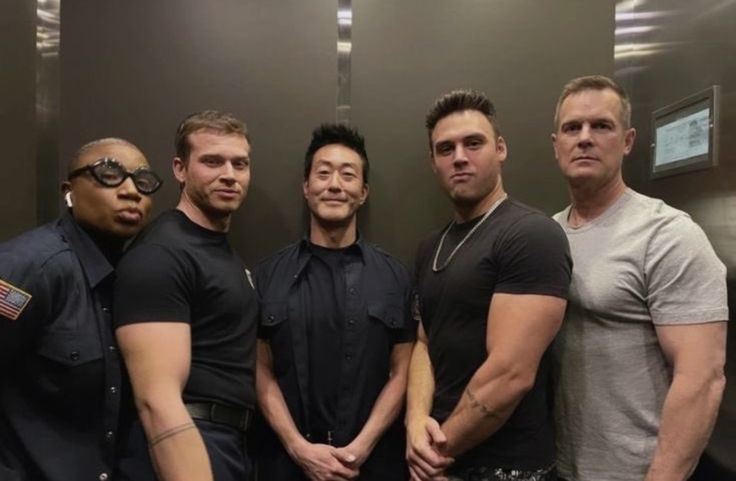Rumor Alert: Taylor Kinney’s Return to Chicago Fire Could Be Bigger Than Expected
The flames at Firehouse 51 are burning hotter than ever. Rumors are swirling that Taylor Kinney’s return to Chicago Fire will mark more than just a homecoming — it could redefine the show’s entire power dynamic.
Kinney, who took a temporary leave during Season 11 for personal reasons, has long been the emotional and professional anchor of the series as Lieutenant Kelly Severide, the fearless leader of Rescue Squad 3. While his comeback in Season 12 thrilled fans, his storylines since have kept him largely detached, often focusing on arson investigations that pulled him away from the firehouse.
Now, insiders suggest that Season 14 will bring a seismic shift — one that places Severide at the very top of Firehouse 51’s chain of command.:max_bytes(150000):strip_icc()/Chicago-Fire-011024-8156b69dde2c44369b4587d99e2ff78f.jpg)
Severide Steps Up as Acting Chief
The biggest sign of this major change? Severide’s appointment as Acting Chief of Firehouse 51.
With long-time Battalion Chief Wallace Boden moving on and new leadership stretched thin, Severide is stepping up. It’s a monumental shift for a man who has always preferred action over administration.
This move signals several turning points:
A Shift in Focus: Severide has often rejected the politics of leadership, choosing the chaos of the front line instead. As Acting Chief, he must now balance fieldwork with management, delegation, and diplomacy — skills he’s avoided but clearly possesses.
The “Stellaride” Test: For the first time, Severide holds authority over his wife, Stella Kidd, herself a lieutenant. Their marriage now intersects with workplace hierarchy, promising both friction and growth as they navigate love, leadership, and duty under one roof.
A Test of Permanence: While the title is “acting,” many believe this storyline could be the show’s way of giving Taylor Kinney a stable, long-term role. A Chief position keeps Severide central to the drama while reducing his physical workload — a smart move for a series veteran.
The Arson Trail: From Investigator to Influencer
Severide’s time with OFI (Office of Fire Investigation) is now paying dividends. What began as a narrative workaround for his absence has evolved into a powerful piece of character development.
Sharper Instincts: His investigative experience gives him a broader, strategic perspective — one that makes him uniquely equipped to lead both in the field and in administration.
Full-Circle Moment: In many ways, this is Severide following in the footsteps of his late father, Benny Severide. By bridging hands-on firefighting with deep-dive arson investigations, Kelly is stepping into a legacy role that extends beyond Firehouse 51 — perhaps even toward a specialized command position within CFD.
The shift not only broadens his influence but could also tie his storyline to larger One Chicago arcs, linking him to city politics, corruption, and high-level fire department intrigue.
“Stellaride” Faces Its Toughest Test Yet
At the heart of this rumored arc is the emotional storm brewing between Severide and Stella Kidd. Their marriage has already endured heartbreak — from family loss to the emotional strain of fostering troubled teen Isaiah. Now, leadership pressures threaten to test them like never before.
Marital Strain: Severide’s expanded duties and fatherhood responsibilities will stretch him thin. The challenge lies in whether the couple can keep their communication strong under the weight of command.
A United Front:
A New Era for Chicago Fire
Taylor Kinney’s rumored promotion isn’t just a storyline twist — it’s a recalibration of the entire show. By giving Severide command of Firehouse 51,
Whether this change is permanent or temporary, one thing is clear:
And that could make Season 14 the most defining chapter in Chicago Fire history.
Athena Meets Her Younger Self to Find the Strength to Live


Athena’s space walk coincides with her interview talking about what it means to be a hero, and flashbacks to her younger self, some years after the murder of her former fiancée, Emmett. On a normal call with her partner, Officer Brogan McCluskey, the two come across an armed bank robbery in progress that turns into a full-blown shootout with the police. McCluskey gets shot while trying to stop the suspects before back-up arrives, leaving him and Athena in a vulnerable position as he bleeds out.
As the stakes ramp up, present-day Athena loses CO2 when her suit gets punctured during a fall and her tether is unhooked. Meaning, Athena has a big chance of floating in space until she dies. In the past, Athena was shot in the leg trying to transport McClusky on foot to the robbers’ getaway van so they could get to the hospital. We see in the interview that this had actually been a conversation between younger Athena and present-day Athena all along. Younger Athena wonders what all the pain has been for, alluding to her desire to give up. Present-day Athena reaches her hand out and says that if there’s a light, there’s always hope.
Athena makes it back to the ISS just in time for the escape pod to launch. However, the reconstructed pod is only able to fit five people. Lewis volunteers to stay back to operate the Dextre arm, so the pod can launch. I have to admit, tears may have fallen during this scene. Lewis finally got his trip to space and was a hero while doing so. The pod lands safely on Earth thanks to Lewis’ sacrifice, and the grounded passengers laugh in relief.
Athena and Hen reunite with their families to close the chapter of this story. Harry announces that he applied to be a firefighter at the LAFD, much to Athena and May’s surprise. In flashbacks, Athena learns from a younger Rick Romero (those two have known each other forever, huh?) that the criminals were tied to a series of unsolved robberies, but McClusky died from his injuries. To honor McClusky and let go of the past, Athena gives her number to a younger Michael Grant.
When the Past Comes Knocking
Have you ever wondered what it would be like to meet your younger self? To look that version of you in the eye and realize how far you’ve come—or maybe how far you’ve strayed? That’s exactly what Athena experiences in one of the most soul-stirring storylines we’ve ever seen. Her meeting with her younger self isn’t just emotional—it’s a raw, transformative journey of rediscovering purpose, love, and the will to live again.
Who Is Athena? The Symbol of Strength and Resilience
Before we dive deep into this emotional encounter, let’s talk about Athena herself. Known as a fearless, compassionate, and strong character, Athena has always been a pillar of courage for everyone around her. But even heroes have breaking points—and this story reveals the cracks behind her armor.
Athena’s journey has always represented resilience. Yet, this time, instead of saving others, she’s forced to save herself.
The Breaking Point: When Strength Isn’t Enough
Everyone reaches that moment when life feels too heavy to bear. For Athena, it’s a culmination of trauma, guilt, and years of fighting battles for everyone except herself.
She’s tired. She’s broken. And for once, she doesn’t know how to stand tall. That’s when something extraordinary happens—she meets her younger self.
The Magical Encounter: Face to Face with Innocence
Imagine standing across from your younger self—the version untouched by heartbreak, fear, or loss. The moment Athena sees her younger self, it’s like time stops.
The air feels heavy, yet hopeful. Her younger self looks at her with pure eyes, unburdened by the world’s cruelty.
This meeting isn’t about time travel or fantasy—it’s about introspection. It’s the ultimate metaphor for healing.
The Dialogue Between Then and Now
Young Athena’s Question: “What Happened to You?”
The first words out of Young Athena’s mouth pierce through like a knife:
It’s not judgment—it’s innocence asking why her future self looks so tired.
That question forces Athena to confront everything she’s been hiding: the pain, the loss, the exhaustion.
The Older Athena’s Realization
Older Athena realizes she’s spent her whole life being strong for everyone but herself. She’s been a warrior, a protector, a leader—but never her own savior.
Her younger self reminds her of the girl who used to dream, who used to believe, who used to smile without fear.
The Mirror Metaphor – Seeing Herself for the First Time
Meeting her younger self becomes like looking into a mirror—one that reflects not her face, but her soul.
She sees who she was, who she became, and who she can still be. That’s the beauty of this encounter—it’s not about changing the past but forgiving it.
Lessons from the Past: What Athena Learns
1. Vulnerability Isn’t Weakness
Athena learns that allowing herself to feel pain doesn’t make her fragile—it makes her human.
Her younger self reminds her that courage isn’t the absence of fear, but the decision to face it.
2. Self-Love Is the Strongest Armor
For so long, Athena’s love was given outward—to her family, her friends, her duty. This moment teaches her that she needs to pour that same love into herself.
3. Healing Takes Time
It’s not about instantly becoming “okay.” Healing is messy, painful, and slow—but it’s worth it.
Athena’s younger self teaches her to be patient, to breathe, and to trust the process.
The Emotional Power of Self-Reflection
Meeting your younger self is the ultimate emotional reset. It strips away the ego, the expectations, and the pressure.
It forces you to face the person you once were—and ask, what would they think of who you’ve become?
For Athena, that moment isn’t just emotional—it’s liberating. She realizes she’s still the same girl deep down, just layered with scars that tell her story.
The Symbolism Behind Athena’s Journey
A Bridge Between Past and Present
The encounter symbolizes the bridge between who she was and who she wants to be. It’s like two souls shaking hands across time.
The Rebirth of the Warrior
Athena’s younger self doesn’t just appear to remind her of the past—she appears to ignite her spirit again.
It’s a rebirth. A moment where Athena stops merely surviving and starts living again.
The Power of Forgiveness
Forgiving yourself is often harder than forgiving others. Athena’s story captures that truth beautifully.
Her younger self forgives her for all the mistakes, the lost dreams, and the tears she never cried.
That forgiveness becomes her healing. Her freedom.

Why This Scene Resonates So Deeply with Viewers
Because we all have a younger version of ourselves hiding inside—waiting to be acknowledged, to be healed.
Athena’s journey mirrors ours. We all want to look back and say, “I made it. I survived.”
Her story reminds us that it’s never too late to rediscover our strength.
The Message Behind Athena’s Transformation
At its core, this scene isn’t just about nostalgia—it’s about rebirth.
Athena learns that strength doesn’t always mean fighting. Sometimes, it means letting go.
Letting go of guilt. Of control. Of the idea that she always has to be the hero.
The Ending: Walking Forward with Grace
After the encounter, Athena doesn’t magically become “whole.” But she walks away lighter.
She carries her younger self’s voice in her heart—a reminder that she’s still capable of joy, love, and laughter.
She finally learns that living isn’t about being unbreakable—it’s about finding beauty in the cracks.
Conclusion: Finding the Strength to Live Again
Athena’s meeting with her younger self is more than a touching moment—it’s a masterclass in healing.
It teaches us that sometimes, the person we need to save is ourselves.
By embracing her past, Athena rediscovers her future. She learns that no matter how broken we feel, there’s always a piece of us—innocent, hopeful, unyielding—waiting to help us rise again.




